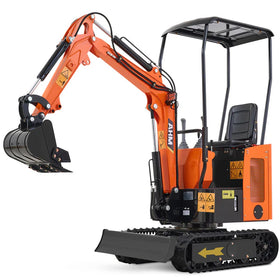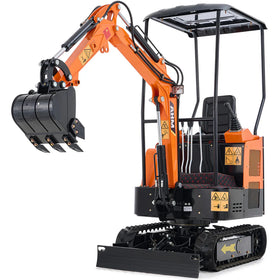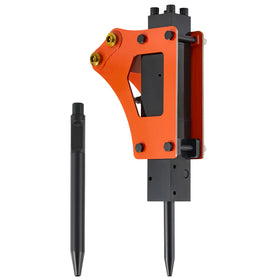Mini excavators are built for heavy lifting, digging, and moving materials around, but what happens when you need to break concrete, rock, or asphalt? Manual jackhammers are slow, exhausting, and dangerous, while renting demolition equipment can become expensive quickly. The solution - a hydraulic breaker attachment!
However, we suggest understanding all the hydraulic breaker for excavator benefits before you pull the trigger. A quality hydraulic breaker can transform your mini excavator into a demolition powerhouse instantly, and you’ll feel the cost savings in the long run.

What is a Hydraulic Breaker for an Excavator and How Does it Work?
A hydraulic breaker attachment works by using your mini excavator's existing hydraulic system to power a high-impact piston that delivers 500-1200 blows per minute with tremendous force.
- It connects to your machine through two hydraulic hoses - one supplies pressurised hydraulic fluid to drive an internal piston, while the return hose cycles the fluid back.
- Nitrogen gas chambers amplify the impact force, driving the repetitive striking action that will break through anything you point it at.
- Most excavator hydraulic breakers are designed for machines with an operating weight of up to 2 tons, with a working pressure of 1740-2500 PSI.
The impressive power-to-weight ratio of mini excavators makes them significantly more efficient than larger machines for this type of breaking work in urban environments.
Top Five Benefits of Hydraulic Breakers for Excavators
1. A Hydraulic Breaker Increases Productivity
- Industry data shows that hydraulic breakers complete demolition tasks 75-85% faster than manual jackhammers.
- Pneumatic tools require compressor breaks and operator rotation due to fatigue, while hydraulic breakers can operate continuously as long as the excavator has fuel.
Professional contractors also report breaking 15-25 cubic yards of concrete per hour with properly sized hydraulic breakers, compared to a mere 2-4 cubic yards per hour with manual tools, which is a 6x productivity increase
2. It Enhances Security
Jackhammer accidents account for 23% of construction tool-related injuries, while hydraulic breaker operators experience virtually zero debris-related injuries. Here, operators work from inside the excavator cab, away from flying debris, dust, and the noise.
Fewer vibrations: About 2 million U.S. workers are exposed to hand-arm vibration, and as many as half will develop HAVS, with many of them being regular users of pneumatic tools.
Hydraulic breaker operators control the attachment from the cab, leading to zero exposure to direct vibrations that can cause long-term health problems.
3. Significant Cost Savings Over Time
Hydraulic breakers only require 1 operator versus the 2-4 manual workers it would take for the same job. At average construction wages of $35-45 per hour per worker, the breaker attachment pays for itself in labor cost savings alone within 200-300 hours of use.
It also reduces fuel and maintenance costs
Not needing a separate compressor means 40-50% lower fuel consumption compared to pneumatic breaking tools. Fewer moving parts than traditional jackhammers also result in 60% lower maintenance costs, according to equipment manufacturers.
4. It Increases Versatility
Suitable for multiple projects: A single breaker attachment can be used for removing residential driveways, preparing commercial foundations, utility trenching, and landscape work.
Hydraulic breakers are excellent for breaking frozen ground during the winter months. On top of that, ice removal and winter demolition can be great revenue streams during the winter, when construction work typically slows down.
5. Compact Size
Accessing tight spaces: Mini excavators with hydraulic breakers can fit through standard 36-inch gates and operate in spaces where larger equipment simply can't access, making them the perfect fit for urban renovations and tight-space demolition projects.
Noise reduction: Modern hydraulic breakers operate at 85-95 decibels compared to the 110-120 decibels of pneumatic jackhammers. This 25-30 decibel reduction lets you work in noise-sensitive urban areas even during normal business hours.

Choosing the Best Hydraulic Breaker for Mini Excavator
Here are some things you should consider if you want to reap the most hydraulic breaker for excavator benefits:
- Match the breaker weight to the excavator size - Ideally, the hydraulic breaker should be 15-25% of your excavator's operating weight
- Check hydraulic flow requirements - Most mini excavator breakers need 8-18 GPM to perform optimally
- Consider the materials you’ll be operating on - Construction work needs high-impact breakers (1000+ BPM), while precision demolition work requires lower-impact units (500-800 BPM)
- Maintenance costs - It costs $500-800 annually for greasing a hydraulic breaker. Also, make sure to factor in weekly nitrogen checks and chisel replacements
- Choose the right chisel type - This affects breaking efficiency by 30-40% depending on the hardness of the material
Recommended Hydraulic Breaker from AHM Corps
AHM Hydraulic Breaker Hammer - $1,299.99
Want the best hydraulic breaker in the game? It’s none other than the AHM hydraulic breaker hammer for mini excavators, which delivers professional-grade performance that can transform your mini excavator into the ultimate demolition machine.
With a 500-1200 impact rate and 1740 PSI working pressure, this attachment can handle everything from concrete sidewalks to building foundations.
Built from high-strength Q235 and 40Cr steel with fewer moving parts for superior durability, and at 165.3 lb operating weight, the AHM hydraulic breaker hammer is perfectly sized for mini excavators up to 2 tons.
What you get with the complete package:
- Hammer body with a nitrogen chamber
- Two premium chisels (1.4-inch) - blunt and flat profiles for versatility
- Two hydraulic hoses with M14x1.5 and M16x1.5 connections
- Mounting hardware and nitrogen charging kit
- Professional toolbox

The Bottom Line
Now you can see that the hydraulic breaker for excavator benefits aren’t just limited to getting things done faster- it's about transforming your mini excavator into a multi-capable machine that opens doors to revenue while also dramatically improving productivity.
The real question isn't whether you need a hydraulic breaker - it's whether you can afford to keep losing time and money to slower, more dangerous alternatives when the solution is more affordable than ever before!







